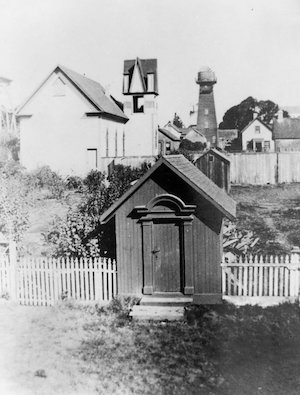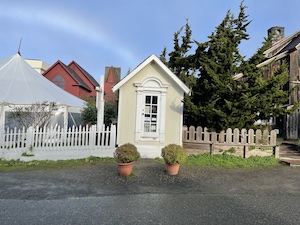
Apple Shed and MacCallum-Kelley Property, 1894 – 1908. The apple shed on the MacCallum house property, looking north from Albion Street directly opposite the Kelley House. A Mendocino-style picket fence runs along the road. Other buildings visible in this image include, left to right: the MacCallum house water tower, the Kelley Baptist Church, the tall Hegenmeyer water tower, and the back porch of Rose McGuire’s Calpella Street house, right of the tower
The Apple Shed on the MacCallum House property is a one-of-a-kind building, even for Mendocino. It was built by Erick Albertson, who also carved the unique statuary on top of the Masonic Lodge of which he was a member. Originally located on the east side of Kelley House near their apple orchard, it was later moved across the street to Daisy Kelley MacCallum’s property. Just like the lodge, the shed’s ceiling is a curved barrel vault, and the doorways and windows are trimmed in the Greek-Revival style with pediments and Doric columns. Measurements reveal that the shed’s diminutive architectural design is based on the Golden Mean, a proportion often used in the Masonic traditions, as well as with ancient buildings throughout the western world to create harmony and beauty. The MacCallum family stored apples here.

January 2022
In 1974, Cherie Christiansen converted the Apple Shed into a potted plant and flower shop, and windows were added to the building. The Mugwump sold potted plants in redwood boxes, made especially for each individual plant. Cherie also sold tomato plants, house plants, and Homer Drinkwater’s beautiful cut flowers, including his famous long-lasting Yellow Water Lilies.
Today, the Apple Shed houses My Chic Farmhouse, a charming home décor and accessories store, owned by Rosanna Bertheola.
Look Tin Eli: The Mendocino Visionary Who Helped Shape the Chinese-American Experience by Robert S. Becker and Jane Tillis – The life of Mendocino-born visionary Look Tin Eli was one of national significance. As a teenager returning home from China in 1884, his illegal detention instigated a court battle, culminating in the state’s legal precedent granting full citizenship for all native-born Californians. After the 1906 earthquake in San Francisco, he was instrumental in establishing Chinatown as a business center and tourist destination. He founded the first Chinese-owned bank, the Canton Bank of San Francisco, and he started the China Mail steamship company. With almost fifty historic images, this first book-length profile of Look Tin Eli brings to life the cultural and commercial achievements of this remarkable trailblazer. $25.